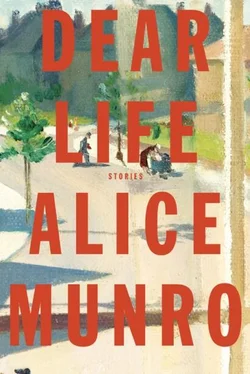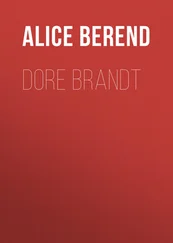I don’t know when my mother first told me this story, but it seems to me that that was where the earlier versions stopped—with Mrs. Netterfield pressing her face and hands against the glass while my mother hid. But in later versions there was an end to just looking. Impatience or anger took hold and then the rattling and the banging came. No mention of yelling. The old woman may not have had the breath to do it. Or perhaps she forgot what it was she’d come for, once her strength ran out.
Anyway, she gave up; that was all she did. After she had made her tour of all the windows and doors, she went away. My mother finally got the nerve to look around in the silence and concluded that Mrs. Netterfield had gone somewhere else.
She did not, however, take the chair away from the doorknob until my father came home.
I don’t mean to imply that my mother spoke of this often. It was not part of the repertoire that I got to know and, for the most part, found interesting. Her struggle to get to high school. The school where she taught, in Alberta, and where the children arrived on horseback. The friends she had at normal school, the innocent tricks that were played.
I could always make out what she was saying, though often, after her voice got thick, other people couldn’t. I was her interpreter, and sometimes I was full of misery when I had to repeat elaborate phrases or what she thought were jokes, and I could see that the nice people who stopped to talk were dying to get away.
The visitation of old Mrs. Netterfield, as she called it, was not something I was ever required to talk about. But I must have known about it for a long time. I remember asking her at some point if she knew what had become of the woman afterwards.
“They took her away,” she said. “Oh, I think so. She wasn’t left to die alone.”
After I was married and had moved to Vancouver, I still got the weekly paper that was published in the town where I grew up. I think somebody, maybe my father and his second wife, made sure that I had a subscription. Often I barely looked at it, but one time, when I did, I saw the name Netterfield. It was not the name of someone who was living in the town at present but had apparently been the maiden name of a woman in Portland, Oregon, who had written a letter to the paper. This woman, like me, still had a subscription to her hometown paper, and she had written a poem about her childhood there.
I know a grassy hillside
Above a river clear
A place of peace and pleasure
A memory very dear—
There were several verses, and as I read I began to understand that she was talking about the same river flats that I had thought belonged to me.
“The lines I am enclosing were written from memories of that old hillside,” she said. “If they are worthy of a little space in your time-honored paper, I thank you.”
The sun upon the river
With ceaseless sparkles play
And over on the other bank
Are blossoms wild and gay—
That was our bank. My bank. Another verse was about a stand of maples, but there I believe she was remembering it wrong—they were elms, which had all died of Dutch elm disease by now.
The rest of the letter made things clearer. The woman said that her father—his name had been Netterfield—had bought a piece of land from the government in 1883, in what was later called the Lower Town. The land ran down to the Maitland River.
Across the Iris-bordered stream
The shade of maples spread
And, on the river’s watery field,
White geese, in flocks are fed
She had left out, just as I would have done, the way the spring got muddied up and soiled all around by horses’ hooves. And of course left out the manure.
In fact, I had once made up some poems myself, of a very similar nature, though they were lost now, and maybe had never been written down. Verses that commended Nature, then were a bit hard to wind up. I would have composed them right around the time that I was being so intolerant of my mother, and my father was whaling the unkindness out of me. Or beating the tar out of me, as people would cheerfully say back then.
This woman said that she was born in 1876. She had spent her youth, until she was married, in her father’s house. It was where the town ended and the open land began, and it had a sunset view.
Our house.
Is it possible that my mother never knew this, never knew that our house was where the Netterfield family had lived and that the old woman was looking in the windows of what had been her own home?
It is possible. In my old age, I have become interested enough to bother with records and the tedious business of looking things up, and I have found that several different families owned that house between the time that the Netterfields sold it and the time that my parents moved in. You might wonder why it had been disposed of when that woman still had years to live. Had she been left a widow, short of money? Who knows? And who was it who came and took her away, as my mother said? Perhaps it was her daughter, the same woman who wrote poems and lived in Oregon. Perhaps that daughter, grown and distant, was the one she was looking for in the baby carriage. Just after my mother had grabbed me up, as she said, for dear life.
The daughter lived not so far away from me for a while in my adult life. I could have written to her, maybe visited. If I had not been so busy with my own young family and my own invariably unsatisfactory writing. But the person I would really have liked to talk to then was my mother, who was no longer available.
* * *
I did not go home for my mother’s last illness or for her funeral. I had two small children and nobody in Vancouver to leave them with. We could barely have afforded the trip, and my husband had a contempt for formal behavior, but why blame it on him? I felt the same. We say of some things that they can’t be forgiven, or that we will never forgive ourselves. But we do—we do it all the time.
Alice Munro grew up in Wingham, Ontario, and attended the University of Western Ontario. She has published twelve collections of stories and two volumes of selected stories, as well as a novel. During her distinguished career she has been the recipient of many awards and prizes, including three of Canada’s Governor General’s Literary Awards and two of its Giller Prizes, the Rea Award for the Short Story, the Lannan Literary Award, England’s W. H. Smith Literary Award, the United States’ National Book Critics Circle Award, the Edward MacDowell Medal in literature, and the Man Booker International Prize. Her stories have appeared in The New Yorker, The Atlantic Monthly, Harper’s Magazine, Granta , and other publications, and her collections have been translated into thirteen languages. Alice Munro lives in Clinton, Ontario, near Lake Huron.
Too Much Happiness
The View from Castle Rock
Runaway
Hateship, Friendship, Courtship, Loveship, Marriage
The Love of a Good Woman
Selected Stories
Open Secrets
Friend of My Youth
The Progress of Love
The Moons of Jupiter
The Beggar Maid
Something I’ve Been Meaning to Tell You
Lives of Girls and Women
Dance of the Happy Shades
Other titles available in eBook format by Alice Munro
Away from Her · 978-0-307-48181-8
The Beggar Maid · 978-0-307-81458-6
Dance of the Happy Shades · 978-0-307-81454-8
Читать дальше












